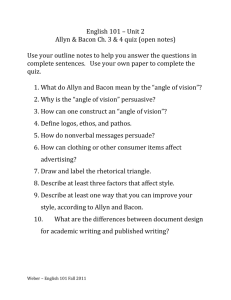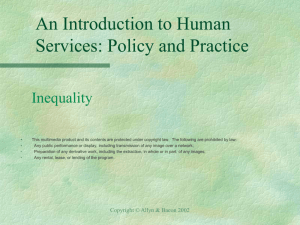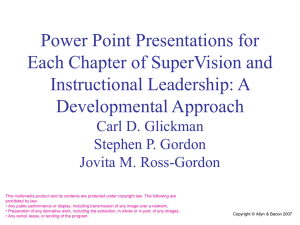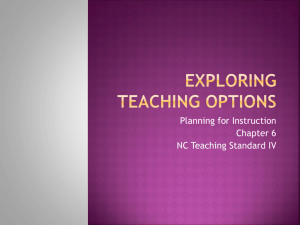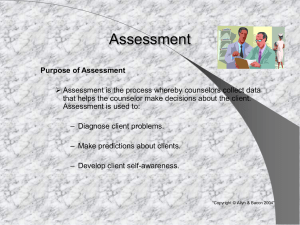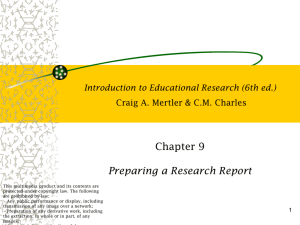Chapter 5
advertisement
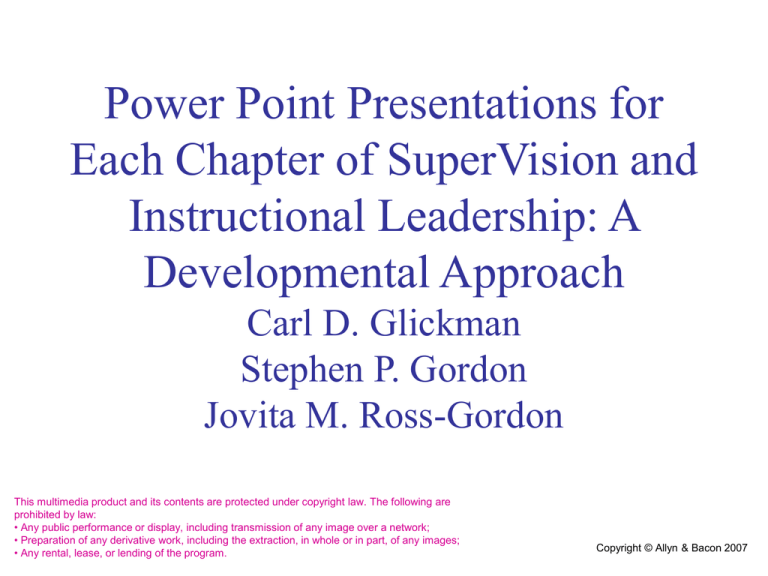
Power Point Presentations for Each Chapter of SuperVision and Instructional Leadership: A Developmental Approach Carl D. Glickman Stephen P. Gordon Jovita M. Ross-Gordon This multimedia product and its contents are protected under copyright law. The following are prohibited by law: • Any public performance or display, including transmission of any image over a network; • Preparation of any derivative work, including the extraction, in whole or in part, of any images; • Any rental, lease, or lending of the program. Copyright © Allyn & Bacon 2007 Chapter 5 Reflections on Schools, Teaching, and Supervision This multimedia product and its contents are protected under copyright law. The following are prohibited by law: • Any public performance or display, including transmission of any image over a network; • Preparation of any derivative work, including the extraction, in whole or in part, of any images; • Any rental, lease, or lending of the program. Copyright © Allyn & Bacon 2007 Effective Teaching Based on your experience and observation, what are the characteristics of effective teaching? Copyright © Allyn & Bacon 2007 The Coast of Great Britain Copyright © Allyn & Bacon 2007 Constructivist Teaching and Learning • What are advantages of constructivist teaching and learning? • What are concerns that schools and teachers moving toward constructivist teaching and learning might need to address? Copyright © Allyn & Bacon 2007 Beliefs about Education 1. In the best of all worlds, which of the following teachers described in Chapter 5 would you teach like? • • • 2. If a group of observers watched you teach over a period of time, which of the following teachers would they say you taught like? • • • 3. Joan Simpson Bill Washington Pat Rogers Joan Simpson Bill Washington Pat Rogers If your answer to question 2 was different than your answer to question 1, why do you think the answers were different? Copyright © Allyn & Bacon 2007 Supervision Beliefs Which of the supervisors described in Chapter 5 would you wish to have as your supervisor? • Bob Reynolds • Jon White • Shawn Moore Why was the supervisor you selected your first choice? Copyright © Allyn & Bacon 2007 Three Super Philosophies Essentialism Experimentalism Existentialism View of Reality Exists outside, absolute, unchanging What works, tentative, constantly changing Individual is source of reality, defines reality How to Learn about Reality Train the mind to think rationally Interact with environment; experiment Engage in selfdiscovery; create meaning Application to Supervision Supervisor is expert; transmits instructional knowledge Supervisor works democratically with teachers Supervisor facilitates teacher exploration and autonomy Copyright © Allyn & Bacon 2007 Supervisory Interpersonal Behaviors Directive Supervision: The supervisor’s role is to inform, direct, model, and assess teaching competencies. Collaborative Supervision: The supervisor’s role is to guide the problem-solving process, be an active member of the interaction, and keep the teachers focused on their common problems. Nondirective Supervision: The supervisor’s role is to listen, be nonjudgmental, and provide selfawareness and clarification experiences for teachers. Copyright © Allyn & Bacon 2007 Relationship of Philosophy, Control, and Supervisory Belief Educational Philosophy Decision-Making Responsibility Supervisory Belief Essentialism Supervisor high, teacher low Directive Experimentalism Supervisor and teacher equal Collaborative Existentialism Supervisor low, teacher Nondirective high Copyright © Allyn & Bacon 2007 Effects of Culture on Beliefs • Do I have more difficulty working with some cultural groups than others? If so, why? • How congruent are my espoused beliefs and actions when working with cultural groups different from my own? • How does my cultural background influence my expectations of and interactions with parents? • How does my cultural background contribute to my perceptions of effective teaching? • How does my cultural background affect my expectations of students in general? My expectations of different student groups? Copyright © Allyn & Bacon 2007 Cultural Effects on a School • How does the dominant culture inform our goals as a school? How do other cultures contribute to our goals? • How is the dominant culture represented in our curriculum, including textbooks and curriculum materials? Are other cultures reflected positively in our curriculum? • How do our cultural beliefs affect the way students are grouped and placed in various programs in our school? Copyright © Allyn & Bacon 2007 Cultural Effects on a School (continued) • How do our cultural beliefs affect the school’s disciplinary practices? • How do our cultural beliefs affect the way we assess student learning? • How do our cultural beliefs affect the way we interact with our students’ families? Copyright © Allyn & Bacon 2007 Practitioner Reflection: Supervisory Platform: What’s your story? • What leadership strategies does the author utilize in her school? • Which of these leadership strategies would you like to utilize? Why? • Which strategies does the leadership team at your school currently utilize? How effective are the strategies? Copyright © Allyn & Bacon 2007
